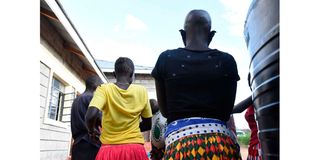West Pokot advocates raise alarm over FGM church crusades

Girls rescued from FGM and early marriages, who are taking refuge at Komesi Resource Centre in Kongelai, West Pokot County on December 08, 2020. Anti-FGM crusaders in the county have called for unity among churches, State officials and NGOs in fighting the vice.
What you need to know:
- Anti-FGM crusaders in West Pokot County have raised concern over night crusades and parties that have led to rise in FGM cases.
- They have also called on church officials not to organise overnight crusades during this festive season.
Anti-female genital mutilation (FGM) crusaders in West Pokot County have raised concern over night crusades and parties, which they say has contributed to many cases of FGM and forced early marriages in the region.
More than 75 per cent of girls in the area are at risk of being subjected to the unkind cut before being married off during this holiday as many ceremonies have been planned, unless the government makes good its threat of arresting the perpetrators, the crusaders say.
They have also called on church officials not to organise overnight crusades during this festive season.
They say many parents who want to cut their girls have taken advantage of the crusades to organise illegal parties where girls are cut.
They add that the culprits do the exercise at night, while others pretend to organise church ceremonies, when they actually want practice FGM.
The crusaders have cautioned parents against subjecting their daughters to the knife, threatening of arrest and prosecution in courts.
They have called for unity among churches, State officials and non-governmental organisations (NGOs) in fighting the vice.
Gospel songs
Led by World Vision Child protection Officer Teresa Cheptoo, the crusaders reveals that parents who want to cut their girls organise the parties secretly and sing gospel songs to avoid raising an alarm when the cut is being done.
“Church crusades at night should be banned during school holidays since many parents and circumcisers have decided to hide in the church. They sing praise and worship songs to fool police and in the process, subject innocent girls to the cut,” she says.
Ms Cheptoo notes that the tough anti-FGM laws have forced parents in the region to seek alternative ways of ensuring their girls pass the rite of passage.
“These night gatherings are the ones contributing to early forced marriages in this county,” she says.
Ms Cheptoo wants the county government to invest in agriculture and educate mothers on modern farming methods as an alternative means of earning a living.
She says she has educated many female cutters on modern farming techniques in her farm, and they have agreed to stop cutting young girls.
“The few I have educated on weather patterns and how to make use of little rains we receive have completely changed and have helped us in educating other women,” she says.
FGM ceremonies
She calls on NGOs working in the region and dealing with anti-FGM projects to educate the community on the importance of girl child education.
“The cut has robbed a whole generation of girls of the opportunity to get education, leaving them to provide for a family while they are still children themselves and lacking the economic empowerment they require,” she says.
She points out that FGM has adversely affected education in the county since there is a low transition of girls from lower primary to upper primary and secondary schools.
Teresa Lokichu of the Pokot Girl Child Network, wants chiefs in the county to report any planned FGM ceremonies before they occur.
Ms Lokichu has also faulted men in the community who are custodians of bad culture and defend traditions.
She says many FGM cases are not reported in the county because of lack of information, illiteracy, ignorance, poor infrastructure and lack of funds to sustain anti FGM campaigns.
“Our campaign efforts have been hampered because of poor infrastructure and lack of network. Residents don’t listen to radios and it is hard to go to hills where the girls hide while undergoing FGM,” she says.
Kongelai, Alale, Tapach, Masol, Cheputel Kacheliba, Masol, Muino, Kapsolion Takaywa, Nyangaita, Nyarkulian, Sondany and Koporo and North Pokot Sub-county Re among the areas where FGM is still rampant in the county.





